VARIOUS
/ COMPILATIONS
EVERY MOUTH MUST BE FED 1973 - 1976 * * *
"Every Mouth Must Be Fed - 1973 - 1976" is a compilation of various material from the Jamaican Micron Music Limited label. They produced, pressed, distributed and promoted Roots oriented music. The man responsible for this label was Pete Weston. Born in Jamaica (St. Elizabeth perish) on 10th April 1950. In 1968 he entered the University of the West Indies to study law. During the evenings he also sold insurance. Encountering Lloyd "Charmers" Tyrell formerly the head of The Charmers changed his life completely. In the early Sixties the vocal group The Charmers was one of the first hit makers with recordings for Prince Buster and Studio One. After this period with the vocal group Lloyd went solo, continuing his career producting local artists. In 1969 Weston and Tyrell started to work together producing the single "Cooyah", a track credited to Lloyd Charmers and The Hippy Boys. Subsequently Weston produced Errol Dunkley's version of Delroy Wilson's "I Love The Way You Walk" entitled "Baby Be True". The B-side was "What's Your Mouse" credited to Pete Wilson. Other tracks were released, as "Introducing Ken Boothe", a version of Ken Boothe's "Can't You See". Another example was "Royal Cord", released on B.B. Seaton's Soul Beat label and based on The Melodians' Rocksteady "It Comes And Goes". Pete was starting to be appreciated in the Jamaican music business. Micron Music Limited label was originally established by Ronnie Burke and Michael Johnson in 1971. Soon the label was loosing money but as Pete was involved in managing things changed for the better. Micron released classics from great producers as Gussie Clarke with Augustus Pablo's "Classical Illusion" and Vivian "Yabby You" Jackson with Big Youth's "Yabby Youth". Weston became close with Bunny "Striker" Lee and Lee "Scratch" Perry. In the meantime Micron also financed the work of other producers and artists. By 1975 Reggae was going international and the label began to loose its importance. This compilation presents a range of various tracks produced by Pete Weston with the exception of two tracks from Bunny Lee ("Wages Of Crime" by Joe Higgs and its Dub version by King Tubby called "Wages Of Crime Version") and two by Lee Perry ("Ska Baby" by Bobby Ellis"and its version called "Ska Version Instrumental"). This compilation is quite heterogeneous, but this is due to the fact that this is a compiltaion about a label not an artist or a producer. Here there is some toasting, some instrumentals and some tracks sung by vocal artists as well. The highlights came from Junior Byles versioning "Ain't Too Proud To Beg" by The Temptations; another cut from Byles called "Lorna Banana"; U-Roy's "The Right To Live" and "Every Mouth Must Be Fed" by I-Roy. Comments: 01. Conference At Waterhouse - Jah
Stitch
RUB-A-DUB SOLDIERS * * * /
It is late 70's - early 80's, classic Roots is slowly shifting to something different: Dancehall is taking the stage with its heavy sound, less Rastafarian inspired lyrichs and strong rhythms. The atmospheres of the dancehall (literally speaking) was brought to the studios. The producers were perfectly answering to the calls from the saturday night crowds: the latter asked for some heavy bass lines more than ever and something new to listen and dance to, the former were ready to deliver this. Actually most of this material was not totally new. Producers used old rhythms changing the arrangements and the style from the 70's creating a whole new tough sound. Of course deejays and toasters were not sleeping at all. Their style emphasized what was created in previous times bringing to the extreme what was the style of their "fathers". Their sound was Rub A Dub!. The band that perfectly expressed this era were the Roots Radics. Legend has that the first Rub A Dub cut was Dennis Brown's "Praise Without Raise" (1979) with Sly Dumbar's unique approach on drums. The main steps of the production of a Rub A Dub single were these: first of all most of the times Linval Thompson or Henry "Junjo" Lawes were the producers. The tracks were played by the Roots Radics at Channel One, then mixed by Scientist or other technicians as Soljie Hamilton, and later brought to King Tubby's for the addition of the voice of the singers or deejays. Thompson suggests that Rub A Dub is just some sort of Dub with a voice over. Agree or not, the style was for sure innovative and powerfull. The present collection offers seventeen tracks which should help to be introduced to the Rub A Dub style. Believe me or not, there are a couples of very good tracks here. The CD presents material from Toyan, Captain Sinbad, Lui Lepkie, Ranking Joe, Little John & Billy Boyo, Lee Van Cliff, Brigadier Jerry, Nicodemus, Yellowman & Fathead, Lui Lepkie, Trinity and U Brown. According to this style, the best material is: Toyan's - "Posse Ready", Captain Sinbad's "Eyes Of The Tiger", Ranking Joe's "Sheperd’s Bush", Lee Van Cliff's "Water Gone", Brigadier Jerry's "Roots Man Skank", Lui Lepkie's "Walter Rodney", Ranking Joe's "River Jordan", Brigadier Jerry's "Fight For Your Rights".
TROJAN ROCKSTEADY RARITIES BOX SET * * * * 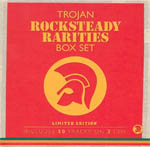 1966-1968 - Trojan - studio
- discs:3
1966-1968 - Trojan - studio
- discs:3The powerful series "Box Set" from Trojan here present the "Rocksteady Rarities". As the historians would confirm, the Rocksteady era had a short life, from late 1966 to late 1968. And of course this is exactly the period covered by this three discs compilation. The preceeding sound, Ska, lasted around five - six years: from 1960/2 to 1966 and it really came to an end when after fourteen months (June 1964 to August 1965) the glorious Skatalites disbanded. The sound lasted for some more time but by the half of 1966 it was almost gone. The new was slower, a lot slower. What would in two - three years change to the even more slow Reggae (or Early Reggae for some) was called Rocksteady! Legend has that the summer of 1966 was particularly hot, and therefore the music followed nature slowing its tempo. Another aspect often mentioned by the historians is that the tensions promoted by the so called Rude Boys had to be somehow controlled. Again a slower tempo was a consequence to adopt. One of the influences of the period came through the American Soul. The harmony groups of the moment had a lot to listen to and take from. A good example is the The Moving Brothers' "Don't Play That Song (Darling I Love You)", or The Silvertones' "Whoo Baby" (actually on a Doo-Wop mood). By the same time another important fact was happening: new producers were slowly emerging. Joe Gibbs , Bunny Lee (former Duke Reid employee), Leslie Kong and Sonia Pottinger started their long career as producers from here. Sonia was particularly impressive since the beginnings with track as The Valentines' "Sock It To Me Baby", The Tennors' "Gee Whiz", Hazel & The Jolly Boys' "Deep Down" and The Conquerors' "Won't You Come Home Now". Ska was gone and the new sound geve the opportunity to experiment new musical shapes. The bass, as with the drums, started to get more importance into the whole structure while in the meantime the hors did not feature any more as the leading pushing force inside the compositions. This seminal change created an imprint for all that followed. Lyrichs also started to become a very important part of the composition: political issues were slowly emerging. When in early 1967 Alton Ellis cut "Rocksteady", the genre became somehow official. In the meantime Ken Boothe named himself "Mr. Rocksteady" and guitarist Lynn Taitt introduced a new way to play. His lines sometimes followed strictly those of the bassist and the force of this style is proved by tracks as Johnny Moore & The Supersonics' "Sound & Soul" or generally by his work with the Supersonics and the Jets. Another two players must also be rememberd: former members of the Skatalites Tommy McCook and Roland Alphonso were seminal figures during the short life of Rocksteady. This compilation, as the title suggests, avoids the most famous tracks from that period and is focused on more underexposed material. Moving through this cronologically structured three discs compilation we can understand why Rockstedy has been so important in the history of Jamaican muisc. The innovations created during Rocksteady influenced all that followed.
DANCEHALL - THE RISE OF JAMAICAN DANCEHALL CULTURE
* * * * 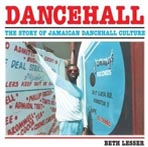 1977-1993 - Soul Jazz Records - studio - discs: 2
1977-1993 - Soul Jazz Records - studio - discs: 2I am not a digital Dancehall fan. I like very much the early period, with those hard rhythms produced for example by Henry "Junjo" Lawes. But when things get edgier and tougher, in other words when I do not hear any more the 70's, I am trapped and perplexed. But the man has to learn more. So after buying the same titled book by Beth Lesser in London, I also went for the two discs compilation from Soul Jazz Records. Thousands of words have been written how and why the Roots came slowly to an end around Bob Marley's death in 1981. And also how a developing new sound was already replacing the previous styles. Every serious book about Jamaican music has a lot to offer about these issues (of course Lesser's is very useful). So it is better to go directly to the material presented here. The material covering the period between 1977 and 1993 is not compiled cronologically, and I have to say that I do not agree with this kind of choices as maybe a cronological progression would help more to understand how the sound changed. But of course we respect the compilers' choice. In any case this is a five stars compilation for the Dancehall fans. But as I said I am not a fan. Disc One opens with "Bam Bam" (1982) from Yellowman and produced by Henry "Junjo" Lawes. The albino Winston Foster started his career around 1981 as a deejay. This track was built around Little Roy's "Prophesy" rhythm. Track two is called "Pumpkin Belly" (1985), sung by Tenor Saw (born Clive Bright, 1966 - 1988) and produced by Lloyd "King Jammy" James (formerly Prince Jammy). Follows "Cu-Oonh" (1993) by Reggie Stepper (born Reginald Williams) and produced by Winston Riley. The intro comes from Fuzzy Jones. Reggie cut this before moving to New York were he started working with Ranking Joe among the others. The fourth song is "Murder She Wrote" (1992) from Chaka Demus and Pliers, and produced by Sly Dumbar and Robbie Shakespeare. Chaka was already succesful through King Jammy sound system and Pliers joyned him with "Gal Wine". "Murder" exposed them internationally. Follows ""Agony" (1987) by Pinchers (born Delroy Thompson in 1965) and produced by King Jammy. His huge second hit came only in 1992 with "Bandolero", again cut for King Jammy. The sixth song is "Deseases" (1982) from Michigan And Smiley, produced by Henry "Junjo" Lawes. The rhythm is based on Alton Ellis' "Mad Mad". Follows Ini Kamoze super hit, five stars "World A Music" (1984), cut for Sly Dumbar and Robbie Shakespeare. The following track is "Cool Out Son" (1993) by Junior Murvin and cut for Bobby "Digital" Dixon. Follows "Entertainment" (1981) by Tristan Palma, Jah Thomas & Toyan. Thomas produced. The Roots Radics provided the music. Follows "Arleen" (1979) from General Echo and cut for Winston Riley and based on the "Stalag 17" rhythm. The eleventh song is another hit: Barrington Levy's "Here I Come" from 1984 and produced by Jah Screw (known also as Paul Love and former U Roy's King Stur-Gav Hi Fi sound system). Follows the hyper fast "Chop Chop" (1993) by Cutty Ranks and produced by Sly Dumbar and Robbie Shakespeare. Follows "M-16" (1982) from Lone Ranger and cut for Joseph Hookim. The fourteenth song is called "Trash And Ready" (1986) by Super Cat and produced by King Jammy. The rhythm is of course Wayne Smith's digital breakthrough "Under Me Sleng Teng" from 1985. Follows Trinity's "Jamaican Dollar" (1977) cut for Joe Gibbs and Errol Thompson. The sixteenth track is "Boxing" (1981) from the great Cornell Campbell and produced by Joe Gibbs and Errol Thompson. The following and last track of disc one is Gregory Isaacs' "Soon Forward" (1979) cut for Sly Dumbar and Robbie Shakespeare. So let us go to Disc Two. It opens with Conroy Smith's "Dangerous". Follows the 12" of "I'm Just A Dread" (1978) by Jacob Miller (featuring Trinity) and produced by Joe Gibbs and Errol Thompson. Millers' superb style is perfectly mached by Trinity's deejay approach. This is one of the best tracks of the compilation. Follows "Informer" (1982) by Lady Ann and cut for Joe Gibbs. One of the first and few females deejays of the early 80's. The third song is "Fred Locks A Dreadlocks" (1977) from Brigadier Jerry and produced by H. Boothe. A deejay tribute to the dread singer Fred Locks. Follows a classic from Eek A Mouse: "Wa Do Dem" (1981), cut for Henry "Junjo" Lawes. The sixth track is "Only Woman With A Degree" (1982) from Sister Nancy (sister of Brigadier Jerry) and cut for Winston Riley. Follows Early B (or Early Black) "Deaf Ears". The eighth tracks comes from Trinity: "Up Town Girl" (1978) and produced by Bunny Lee. Follows "Spar With Me" (1983) from Toyan and cut for Henry "Junjo" Lawes. The tenth song is "Sensi Addict" (1986) from Horace Ferguson and cut for Prince Jazzbo. Follows Clint Eastwood's "Jump And Pawn" (1977) cut for Ossie Hibbert. The twelveth track is called "Greetings" (1984) sung by Half Pint and produced by George Phang. A raggamuffin hit. Follows Reggie Stepper "Under Mi Sin Ting" (1992) cut for Jah Screw. The fourteenth track is "Call The Brigade" (1986) by Frankie Paul and cut for Prince Jazzbo. Follows "Track Shoes" (1979) by General Echo and produced by Carlton Patterson. The second disc closes with Cornell Campbell's "Mash You Down" (1977) cut for Ossie Hibbert. The original Studio One rhythm is called (1968) and later recut by Leroy Smart as "Ballistic Affair". The version presented here is a 12" featuring Ranking Trevor. So here we are. I highly appreciate the material from the 70's, but I really cannot do the same with what comes after 1985. On the other side I am able to appreciate the efforts from the compiler and I am sure that the Dancehall lovers will enjoy this great opportunity to hear some already very famous tracks plus some less known. This is a very good compilation and the sleeve notes by Steve "Rough Guide To Reggae" Barrow are highly informative as expected. Enjoy, you with better ear than me.
STUDIO ONE ROOTS VOL. 3
* * * 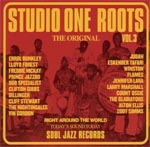 1972-1979 - Soul Jazz Records - studio - discs: 1
1972-1979 - Soul Jazz Records - studio - discs: 1London based "Soul Jazz Records" here presents its third chapter of various Studio One' Clement "Coxsone" Dodd' 70's Roots tracks. The compilation opens with Freddie McKay's "(I'm) A Free Man" (1972). Follows the deep "A Change Is Gonna Come" from Jennifer Lara (1978). The third track is Alton & Zoot's "Oppression". Follows Winston Flames' "In A Armagideon" (1979). The fifth track is Dillinger's "Babylon Fever". Some toasting from 1973. Follows The Gladiators "Re Arrange" (1975). The sith track comes from Vin Gordon and is titled "Fullness". Follows Larry Marshall's "Better Must Come". The nineth track is Cliff Stewart's "Burn Collie" (1973). Follows Cedric Im Brooks & Count Ossie's "So Long Rastafari Calling" (1975). A typical Nyahbingi, horns filled, track to be expected from those artists. The eleventh track is "What A Situation" from The Nightingales. Follows "Brimstone & Fire" from Clifton Gibbs & The Selected Few (1972). Follows a track from Studio One's boss (Dub Specialist). This is a reprise of the main rhythm of the Abyssinians immortal "Satta Massagana", here retitled "Musical Science" and filled by jazz horns (1975). The fourteenth track is "Creation Skank" from Prince Jazzbo (1973). Follows "Way Down Low" from Errol Dunkley. The sixteenth track is "Where It's At" from Lloyd Forest . Follows "Let's Make Love" from The Dynamic Four (1973). The compilation closes with Judah Eskender Tafari's "Jah Light" (1978). Some good Roots plus a couples of gems.
STUDIO ONE ROOTS * * * /
"Studio One Roots" is the first chapter of three releases by Soul Jazz Records dedicated to Roots Reggae from of course Studio One. This compilation actually presents different sides of Reggae. There is Nyahbingi and more classic Roots oriented tracks. Several tracks of both categories are also Ska and Jazz infuenced. A highly rough categorization can be done as follows. The Nyahbingi oriented tracks are "Meditation" (The Cyclones with Count Ossie), "Lumumbo" (Bunnie & Skitter), "Blackish White" (Alton Ellis) and "Drum Song" (Devon 'Soul' Russel). The Ska spiced songs are "Addis A Baba" (Willie Williams) and "Africa" (The Gayladds). The Jazz flavoured tracks are "More Creation" (Lenny Hibbert) and "Congo Rock" (Sound Dimension). More tipically Roots are "Natty Don't Go" (Cornell Campbell), "Africa Here I Come" (Freddie McGregor), "Set Me Free" (L. Crossdale), "Far Beyond" (Leroy "Horsemouth" Wallace) and "You'll Get Your Pay" (Linton Cooper). For the three remaining tracks it is quite difficult to consider them as part of a specific category. These are "Fear Not" (Winston Jarrett), "School Children" (Black Brothers) and "African Challenge" (Zoot Simms). In any case and since the tracks presented here are all singles this is a compilation to check carefully.
STUDIO ONE DISCO MIX * * * * 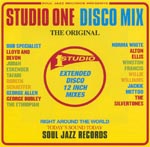 1971-1980 - Soul Jazz Records - studio - discs: 1
1971-1980 - Soul Jazz Records - studio - discs: 1This compilation from Soul Jazz Records is part of a series of releases about the legendary Clement "Sir Coxsone" Dodd Studio One material. This volume is about the practice of Disco Mixes. As the second half of the 70's saw the slowly drift of certain sounds toward Dancehall atmospheres, many producers started to record new artists whose material was often a reprise of classic Studio One rhythms. Coxsone did the same with his own artists by making them recut some 60's rhythms. A new technological device, the 12" single, permitted the development of the Disco Mix. Born in the U.S.A. this extended vynil device permitted to double the length of the song and it was basecally used in the Disco music market. The length permitted a more extended use of the mixer, a practice already used in Jamaica through the Dub experiments since many years. The Jamaican Disco Mixes were made by the original song plus its Dub version. Studio One Disco Mixes featured original 7" and 12" mixes combined together. The material here is quite various with a few becking bands that share the same core made by Vin Morgan, Leroy "Horsemouth" Wallace, Bagga Walker, Cedric Brooks and Pablove Black. Here we can find some long time established artists as Alton Ellis, The Ethiopian (Leonard Dillon from The Ethiopians), Sugar Minott, and Willie Williams; and some less famous ones as Norma White, George Dudley and George Allen. All the material presented here is worth listening with some gems: the Roots of Judah Eskender Tafari's "Rastafari Tell You"; Jackie Mittoo's "Night In Ethiopia" (versioning the immortal classic "Satta Massagana" from the Abyssinians); the Nyahbingi influenced tune from George Dudley called "Gates Of Zion"; both Willie Williams versions of "Armagideon Time"; and finally Winston Francis and Jackie Mittoo's "Going To Zion".
CHURCHICAL CHANTS OF THE NYABINGI
* * * * 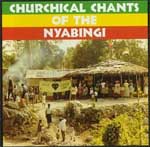 1982 - Heartbeat - studio - discs: 1
1982 - Heartbeat - studio - discs: 1When searching for some Nyahbinghi music on CD the common choice is Count Ossie and the Mystic Revelation Of Rastafari or Ras michael & The Sons Of Negus sets. But as stated in their pages in this web site they are not delivering Nyahbinghi in its purest form. Thanks to this brave release from Heartbeat, we are able to listen to some pure and edgy Nyahbinghi music. This field recording was made in Freeman's Hall, Trelawnwy at the Church Ttiumphant Of Jah Rastafari and Haile Selassie I Teocracy Government under the supervision of Ras Daniel. This grounation was held during the state visit of the late president of the United States, Ronald Regan in April 1982. The grounation lasted seven days, from the six to the twelve of April. The recordings available in this set are excerpts of tracks that last from fifteen minutes to one hour. This aesthetic and ethnographic experience is based on the Rastafari message of anger and indignation about the oppressed condition of the black men through the history of Jamaica. This powerful set comes with a booklet containing a frief description of when these recordings were made, a history of the Rastafari movement in Jamaica, a description of the meaning of Nyahbinghi, plus some extensive footnotes. To complete the booklet the editor added the lyrics of the songs. These recordings will bore those which are not interested in the purest form of the Rastafari music, but will be a blazing light and an invigorating force for those that want to "overstand" it. Not to speak about the bredrin and the dawtas. Selassie Jah.
NICE AN' RUFF
* * * / 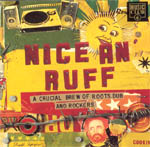 VARIOUS - Music Collection - studio - discs: 1
VARIOUS - Music Collection - studio - discs: 1This is the first compilation that I bought. This happened many years ago and its cover was very intriguing. Actually I think that this compilation can be appreciated by someone which is not a new comer. It is very eclectic and it deserves some previous knowledge of Reggae history to appreciate it. K.C. White's "No, No, No" is a wonderful track. "Things In Life" is a mellow tune from the great Dennis Brown. The compiler pays respect to the Abyssinians with "Y Mas Gan". Mutabaruka delivers "Set The Prisoners Free". I-Roy's "Maggie Breast" is a must. "Kingston Town" from Lord Creator is a beautiful song! Sugar Minott sings "Good Thing Going" and is NICE VIBES! The Tamlins "Baltimore" proves that Jamaican vibes vs. the original song is an easy win!. The rest is less interesting or at least not so representative about that single artist presented here. This is a clever and tricky compilation.
TIGHTEN UP - VOLUME 1
* * * * 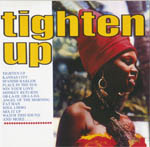 1968 - Trojan - studio - discs: 1
1968 - Trojan - studio - discs: 1 This very important compilation (originally twelve tracks) was released in the U.K. in 1968. Thanks to Trojan the British audience became aware of the great Jamaican music of that year. Rocksteady and early Reggae was finally accepted and from that time the attitude to dismiss it as uninspired changed radically. This Jamaican lower class music had all the ingredients to fulfill the needs of the lower class, black and white, British young members. So it is impossible to deny the cultural effects produced by the Jamaican music in the U.K.. This was and still is a collection of "tried and trusted" Jamaican hits from the end of 1968. You will find for sure your gem. This re-release contains the original twelve songs plus thirteen (!) other tracks. Priceless! Don't miss it if you are interested to know who slowly Reggae was emerging.
REGGAE FOR KIDS * * / 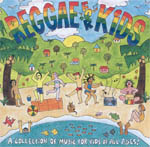 VARIOUS - Ras Records - studio - discs: 1
VARIOUS - Ras Records - studio - discs: 1This is not such a bad compilation at the end, and remember that it was compiled for your pickneys... not for you, grown up mammy and daddy! You have already stuffed the whole house with your mature Reggae albums. Or at least I like to see it that way! Not everything is a nice choice but listen to "Three Little Birds" from Freddie McGregor and even if you are 45 years old you will get the joyful vibes. But putting aside the tracks that can be saved, the feel is that the compiler did not thought completely to the "vibes" of the songs but only to the rhythm. And I think that what a rhythm can give (whatever your age) is not what a good vibe gives. If you have some nice Reggae records of your own and you think that you can choose for some nice songs for your childs, make your own compilation. Otherwise ask a Reggae friend to compile one for you.
OMPS - THE HARDER THEY COME
* * * * 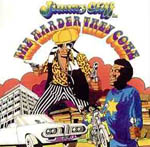 VARIOUS - Island - studio - discs: 1
VARIOUS - Island - studio - discs: 1In 1972 things changed: the director Perry Henzell released "The Harder They Come" and for the first time ever the white audience got a glimpse of the real Jamaica, not that one about a nice vacation in the Carribean but that one about struggle, tribulations and rude boys and Kingston "shanty towns". The movie is about the adventures of Rhygin, a rebel played by the great Jimmy Cliff. Neddless to say six beautiful Cliff's songs are presented here. To be more precise "You Can Get It If You Really Want" comes twice. The rest of the material are classics as with Jimmy Cliff songs. That material comes from: Scotty, The Melodians, The Maytals, The Slickers and Desmond Dekker. The sound is early Reggae, Ska and Rocksteady. As for the movie "Rockers" (1977) you can listen to this soundtrack without the images. The songs are so powerful that they transmit the flavours of the island immediately. If you liked this beautiful movie buy this compilation. If you liked the music buy the DVD. If you are a new comer check both. You will enjoy!
OMPS - ROCKERS * * * * / 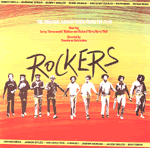 VARIOUS - Island - studio - discs: 1
VARIOUS - Island - studio - discs: 1Before writing any comments up on the "Rockers" soundtrack, it is the case to remark that this movie (1977) is a masterpiece. This is the jamaican story of a drummer and his struggle to fight for justice. The most fascinating thing is that almost all of the characters are played by real life musicians or people related to the music industry. Among these there are: Leroy "Horsemouth" Wallace (the main character), Richard "Dirty Harry" Hall, Jacob Miller, Gregory Isaacs, Burning Spear, "Jack Ruby" Lindo, Frank "Kiddus-I" Dowding, Robbie Shakespeare, Big Youth, The Abyssinians, The Mighty Diamonds, Joe Gibbs, Earl "Chinna" Smith. But we are not here to write about a movie, we are here for the soundtrack. I always thought that there are two kind of soundtracks: one is almost impossible to hear without the images to support it, and the other can be listened without and this happens because there is no need. "Rockers" belongs to the second category. In this compilation everything is interesting. Maybe some things are well known, but this movie was not supposed to bring new and previously unheard material. There are two pure gems here: Junior Byles "Fade Away" (with Jo Jo Hookim of Channel One) and "Graduation In Zion" from the poet Kiddus-I. Unforunately what is missing here is the Nyahbinghi drum based version of "Satta Massagana" which is played by the Abyssinians themselfs at the real beginning of the movie.
GET UP STAND UP
* * / 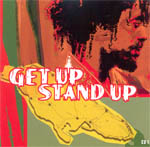 VARIOUS - Universal - studio - discs: 3
VARIOUS - Universal - studio - discs: 3This is a quite nice compilation basecally dedicated to the new comers (as I was when I bought it). Even if all is already known the compilers tried to keep some style. They half succeeded in their intents. The tracks are not all representative of the artist choosed even if from time to time they are very appropriate. And this attitute to put together whatever is available happens almost every time when it is a big label, not involved with Reggae, to do the job. So comes the question: is the compiler ignorant or there were pressures or limitations by the artists labels? Who knows or cares. At the end I think that a three discs compilation should be compiled following some rules. As an example it could be nice to follow a chronological path to help the listener. Well... at the end this three discs set could be useful to make your own compilation. I want to add that the two and a half stars here are not given to the songs but to the compilers. 70 % of the tracks are great.
REGGAE GOLD - 2004
* * * 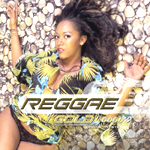 VARIOUS - VP - studio - discs: 2
VARIOUS - VP - studio - discs: 2I do not like this kind of things: VP release the "Reggae Gold" compilation and half of the tracks are Dancehall. At this point why not writing "Reggae & Dancehall - Gold"? Maybe the Dancehall tunes are nice but I do not deal with them too much. I get bored very quickly. By the way... getting back to the compilation title, here you will find: Alicia Keys ("You Don't Know My Name / Will You Ever Know It"), Natty King ("No Guns To Town"), Richie Spice ("Earth Ah Run Red"), Beres Hammond ("Pride & Joy"). This two discs edition comes with a megamix of the songs presented in the first disc by Black Kat. VP is a great label but it should start to change the titles of his compilations.
RIDDIM CONFESSIONS - "GASH DEM" VERSIONS
* * * 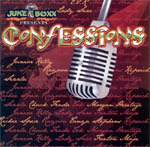 2006 - Juke Boxx - studio - discs: 1
2006 - Juke Boxx - studio - discs: 1This is a compilation based on the "Confessions" riddim and it came straight with the controversy around Chuck Fenda's version "Gash Dem". It is pretty difficult to judge a riddim based compilation. First of all you must love the riddim at high extent. Than you should try to concentrate only on the best versions otherwise you could get bored. Chuck Fenda's is undoubtly a great hit. Sizzla has very self-confidence. As Tanya Stephens. Junior Kelly's version it's worth the hearing. Fantan Mojah sounds militant and tough. Richie Spice is a little bit too much mellow. Natural Black is inna good sing-jay style. The same for Teflon. The highlight is reached literally at the end with an acoustic guitar to back Tok. Great stuff.
REGGAE EXPLOSION
* * * / 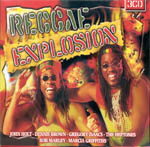 VARIOUS - mcps - studio - discs:
3
VARIOUS - mcps - studio - discs:
3Most of the compilations available on the market are for new comers and it is quite difficult to find a more developed one expecially when it is not a DJ / Reggae "private" fan kind of thing. In this case "mcps", from the Netherlands, made a very good job. The compiler goes basecally for Roots and on 56 tracks maybe only 15% are commercial material. The rest spreads through a huge number of not so commonly known artists for the above mentioned new comers. Where do you find a compilation with Cornell Campbell, Leonard Dillon, Delroy Wilson or Johnny Clarke? In this case, thanks to "mcps" there are them and a lot more. More than this it must be said that the tracks choosed to represent them are most of the time first quality songs of real Roots Reggae from the 70's. At "mcps" they are genius or crazy: the cardboard cover is quite typical for a very low quality compilation (you see it above: a couple of Rasta with a smile)... but the content is made of very high quality music! And I want to stress again that if you put aside a couples of songs the rest is very very interesting. This is a compilation for somebody that knows already that Reggae is not only "Red Red Wine" from UB40. (Is UB40 a serious Reggae band? ...) Here there is other kind of stuff and it will enlight those that already know a couple of songs and those that want to search and learn too. Good job here! And very good vibes!
REGGAE LOVE SONGS
* * * 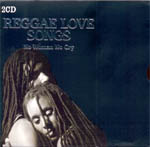 VARIOUS - mcps - studio - discs: 2
VARIOUS - mcps - studio - discs: 2The "mcps" label, from the Netherlands, compiled this double CDs collection of so called Reggae Love Songs. Quite all the material is worth listening. There is some Soul based music with some tracks there are defenitely too much commercially mainstream. But fortunately they are just a few. But among these tracks there is other stuff (basecally Roots / Lover's Rock) quite interesting. On CD 1 check this: "Lady" (Wayne Wade), "Hey Love" (John Holt), "Trick In The Book" (Cornell Campbell), "Positive Movements" (The Paragons), "I'm Still In Love" (Alton Ellis), "Love Disguise" (Gregory Isaacs), "Key To The World" (Ruddy Thomas), "Woman, I Tell You No Lie" (Dennis Brown). On CD 2 check this: "Love Overdue" (Gregory Isaacs), "You Are My Honey" (Dennis Brown), "I Need Your Love" (Toots & The Mytals), "Lovers Paradise" (Dennis Brown), "The Same Song" (The Heptones), "Your Arms" (Roman Stewart), "The Drifter" (Cornell Campbell), "Peacemaker" (John Holt). All useful material to compile with other songs from other sources.
REGGAE MEGA PARTY
* * 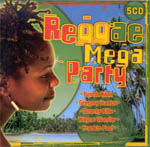 VARIOUS - mcps - studio - discs: 5
VARIOUS - mcps - studio - discs: 5This is a collection of different length extracts of concerts from various artists. Unfortunately there is no note about the when and where these recordings were made. There is a lot of material since the five discs. The quality of the sound is quite poor and it is as if it was extracted from those poor quality DVDs covering some Jamaican night. There is no "mega party" here, but only some boring material. |
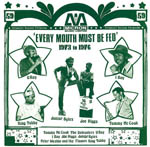 1973-1976 - Pressure Sounds - studio -
discs:1
1973-1976 - Pressure Sounds - studio -
discs:1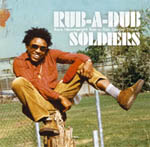 1980-1983 - Makasound - studio - discs:1
1980-1983 - Makasound - studio - discs:1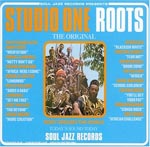 1970s - Soul Jazz Records - studio - discs: 1
1970s - Soul Jazz Records - studio - discs: 1